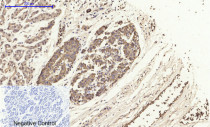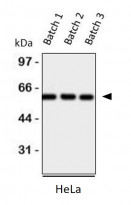ARG66431
anti-TNFRSF11B / OPG antibody
anti-TNFRSF11B / OPG antibody for IHC-Formalin-fixed paraffin-embedded sections,Western blot and Human,Mouse,Rat
Overview
| Product Description | Rabbit Polyclonal antibody recognizes TNFRSF11B / OPG |
|---|---|
| Tested Reactivity | Hu, Ms, Rat |
| Tested Application | IHC-P, WB |
| Host | Rabbit |
| Clonality | Polyclonal |
| Isotype | IgG |
| Target Name | TNFRSF11B / OPG |
| Antigen Species | Human |
| Immunogen | Synthetic peptide within aa. 10-90 of Human TNFRSF11B / OPG. |
| Conjugation | Un-conjugated |
| Alternate Names | OCIF; Osteoclastogenesis inhibitory factor; Tumor necrosis factor receptor superfamily member 11B; PDB5; Osteoprotegerin; OPG; TR1 |
Application Instructions
| Application Suggestion |
|
||||||
|---|---|---|---|---|---|---|---|
| Application Note | IHC-P: Antigen Retrieval: Heat mediation was performed in Sodium citrate buffer (pH 6.0) for 20 min. * The dilutions indicate recommended starting dilutions and the optimal dilutions or concentrations should be determined by the scientist. |
Properties
| Form | Liquid |
|---|---|
| Purification | Affinity purification with immunogen. |
| Buffer | PBS, 0.02% Sodium azide, 50% Glycerol and 0.5% BSA. |
| Preservative | 0.02% Sodium azide |
| Stabilizer | 50% Glycerol and 0.5% BSA |
| Concentration | 1 mg/ml |
| Storage Instruction | For continuous use, store undiluted antibody at 2-8°C for up to a week. For long-term storage, aliquot and store at -20°C. Storage in frost free freezers is not recommended. Avoid repeated freeze/thaw cycles. Suggest spin the vial prior to opening. The antibody solution should be gently mixed before use. |
| Note | For laboratory research only, not for drug, diagnostic or other use. |
Bioinformation
| Database Links | |
|---|---|
| Gene Symbol | TNFRSF11B |
| Gene Full Name | tumor necrosis factor receptor superfamily, member 11b |
| Background | The protein encoded by this gene is a member of the TNF-receptor superfamily. This protein is an osteoblast-secreted decoy receptor that functions as a negative regulator of bone resorption. This protein specifically binds to its ligand, osteoprotegerin ligand, both of which are key extracellular regulators of osteoclast development. Studies of the mouse counterpart also suggest that this protein and its ligand play a role in lymph-node organogenesis and vascular calcification. Alternatively spliced transcript variants of this gene have been reported, but their full length nature has not been determined. [provided by RefSeq, Jul 2008] |
| Function | Acts as decoy receptor for TNFSF11/RANKL and thereby neutralizes its function in osteoclastogenesis. Inhibits the activation of osteoclasts and promotes osteoclast apoptosis in vitro. Bone homeostasis seems to depend on the local ratio between TNFSF11 and TNFRSF11B. May also play a role in preventing arterial calcification. May act as decoy receptor for TNFSF10/TRAIL and protect against apoptosis. TNFSF10/TRAIL binding blocks the inhibition of osteoclastogenesis. [UniProt] |
| Cellular Localization | Secreted. [UniProt] |
| Calculated MW | 46 kDa |
| PTM | N-glycosylated. Contains sialic acid residues. The N-terminus is blocked. [UniProt] |
Images (2) Click the Picture to Zoom In
-
ARG66431 anti-TNFRSF11B / OPG antibody IHC-P image
Immunohistochemistry: Paraffin-embedded Human stomach cancer tissue stained with ARG66431 anti-TNFRSF11B / OPG antibody at 1:200 dilution (4°C, overnight). Antigen Retrieval: Heat mediation was performed in Sodium citrate buffer (pH 6.0) for 20 min. Negative control was used by secondary antibody only.
-
ARG66431 anti-TNFRSF11B / OPG antibody WB image
Western blot: HeLa cell lysate stained with ARG66431 anti-TNFRSF11B / OPG antibody from 3 batches.







